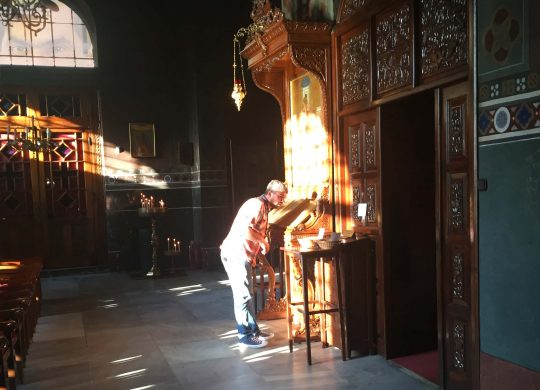Veneration!

When I was in Greece last year, I stepped into an Orthodox church in Thessaloniki, in Northern Greece. It was pretty deserted, so I made my around the precincts, taking pictures, enjoying the solitude. That’s when a young guy came in, looked around in the foyer, and made his way to the open Bible on display right inside the main entrance.
And he proceeded to kiss it!
Kissing an icon in an Orthodox Church is quite a common practice, especially of Jesus. Folks will usually cross themselves, kiss the hand of Jesus in the icon, and cross themselves again. Parents will urge their little ones to kiss the feet in the icons of saints. And so on.
Some would consider all this idolatry. But the Orthodox Church considers an icon as a window into heaven, an image of another reality, a greater reality, a truer world. Indeed the creation of an Orthodox icon is governed by a number of rigorous rules: the iconographer must be spiritually prepared by fasting and prayer, must quiet his spirit and submit himself to God; the icon remains unsigned; it is painted using a prescribed pattern passed down through centuries; etc. Its purpose is to aid worship and to invite prayer.
As St. John of Damascus (675–749) put it:
I do not venerate matter, I venerate the fashioner of matter, who became matter for my sake, and in matter made his abode, and through matter worked my salvation.”
But this was a bit unusual—kissing the Bible. Then again, maybe not. Just look at Psalm 119.
Scripture takes center stage in this psalm that refers to “law,” “commandment,” “judgment/ordinance,” “testimony,” “statute,” “precept,” “word,” and “saying.” And every one of the 176 verses in this Psalm either addresses or refers to Yahweh.
There are numerous supplications to God in Ps 119 for divine insight into his word: that the psalmist would be taught God’s statutes and ordinances (119:12, 26, 33, 64, 68, 102, 108, 124, 135, 171), that his eyes would be opened God’s law (119:18), that God’s commandments would not be hidden (119:19), that he would be made to understand God’s precepts, law, commandments, and testimonies (119:27, 34, 73, 125, 144, 169), that his heart would be inclined to God’s testimonies (119:36), and that God’s word would be confirmed (119:38).
What is striking is that the psalmist models an attitude of devotion to Scripture:
This devotion to Scripture of the psalmist (and of the preacher) is not merely lip-service, but a matter of the “heart”:
With all my heart I have sought You;
Do not let me wander from Your commandments.
Psalm 119:10
Your word I have treasured in my heart.
Psalm 119:11
Give me understanding, that I may observe Your law
And keep it with all my heart.
Psalm 119:34
Incline my heart to Your testimonies.
Psalm 119:36
With all my heart I will observe Your precepts.
Psalm 119:69
May my heart be blameless in Your statutes.
Psalm 119:80
I have inherited Your testimonies forever,
For they are the joy of my heart.
Psalm 119:111
My heart stands in awe of Your words.
Psalm 119:161
As did the psalmist, so also should we engage Scripture, with a heartfelt devotion to God and his word.
I shall delight in Your commandments,
Which I love.
Psalm 119:47
And Scripture teaches us to “fear God.”
Establish Your word to Your servant,
As that which produces reverence for You.
Psalm 119:38
The result will be blessing:
Blessed are those who keep His testimonies,
Who seek Him with whole heart.
Psalm 119:2











 Abe Kuruvilla is the Carl E. Bates Professor of Christian Preaching at The Southern Baptist Theological Seminary (Louisville, KY), and a dermatologist in private practice. His passion is to explore, explain, and exemplify preaching.
Abe Kuruvilla is the Carl E. Bates Professor of Christian Preaching at The Southern Baptist Theological Seminary (Louisville, KY), and a dermatologist in private practice. His passion is to explore, explain, and exemplify preaching.